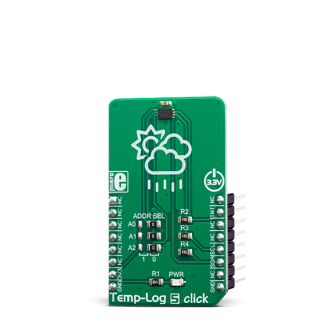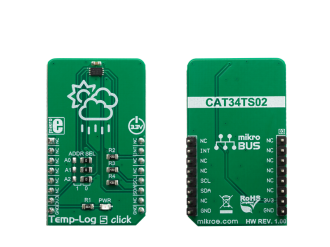
We strongly encourage users to use Package manager for sharing their code on Libstock website, because it boosts your efficiency and leaves the end user with no room for error. [more info]

Rating:
Author: MIKROE
Last Updated: 2019-04-02
Package Version: 1.0.0.0
mikroSDK Library: 1.0.0.0
Category: Temperature & humidity
Downloaded: 4083 times
Not followed.
License: MIT license
Temp-Log 5 click is a temperature measuring Click board featuring the CAT34TS02, an accurate temperature sensor IC with integrated Serial Presence Detect EEPROM.
Do you want to subscribe in order to receive notifications regarding "Temp-Log 5 click" changes.
Do you want to unsubscribe in order to stop receiving notifications regarding "Temp-Log 5 click" changes.
Do you want to report abuse regarding "Temp-Log 5 click".


Library Description
The library initializes and defines the I2C bus driver and drivers that offer a choice for writing data in TS register and read data form TS register. The library contains function for reading Temperature data, functions for writing and reading EEPROM, functions for reading Interrupt status and temperature status. The library provides full control of all the registers that the modules contain.
Key functions:
float templog5_getTemperature() - Temperature Datavoid templog5_writeEEPROM(uint8_t start_addr, uint8_t *dataIn, uint8_t nByte) - Write EEPROMvoid templog5_readEEPROM(uint8_t start_addr, uint8_t *dataOut, uint8_t nByte) - Read EEPROMExamples description
The application is composed of the three sections :
void applicationTask()
{
float Temperature;
Temperature = templog5_getTemperature();
FloatToStr(Temperature, demoText);
mikrobus_logWrite("--- Temperature: ", _LOG_TEXT);
mikrobus_logWrite(demoText, _LOG_LINE);
mikrobus_logWrite("------------------------", _LOG_LINE);
Delay_1sec();
}
Other mikroE Libraries used in the example:
I2CUARTConversionsAdditional notes and informations
Depending on the development board you are using, you may need USB UART click, USB UART 2 click or RS232 click to connect to your PC, for development systems with no UART to USB interface available on the board. The terminal available in all MikroElektronika compilers, or any other terminal application of your choice, can be used to read the message.